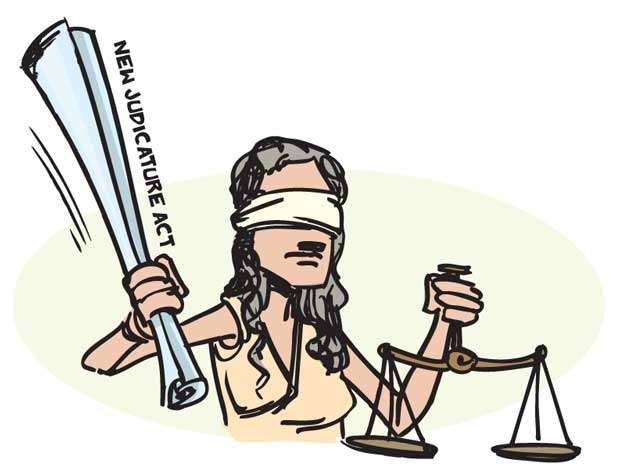New Judicature Act gives fresh hope for justice

History tells us that in a democratic society, justice delayed is justice denied. We also know that justice hurried could turn out to be justice miscarried or buried. Therefore, as in so many vital areas, a reasonable solution lies in the middle path.
Parliament on Wednesday passed a bill to set up Special High Courts through which the government says it hopes to expedite cases involving large-scale bribery, corruption, fraud or other political crimes.
The “Judicature (Amendment)” Bill was passed with amendments as recommended by the Supreme Court which had ruled that if those amendments were not made the passage of the bill would require a two-thirds majority which the coalition government may not be able to get because of the recent crossovers. After the second reading, the bill received 119 votes in favour and 52 against. That means a majority of 67 votes. The vote was conducted electronically. Thereafter, the third reading or the committee stage debate took place and the Bill was passed without a vote being taken.
In terms of the Act, permanent High Courts at Bar will be set up to try, hear and determine the trials of the offences specified in the Sixth Schedule of the Act.
The Act is expected to expedite the judicial process of cases regarding serious frauds, corruption and other high profile crimes.
The sixth schedule includes dishonest misappropriation of Property, criminal breach of trust by public servants in respect of money, forgery for the purpose of cheating, falsification of accounts, conspiracy and Abeitment to commit the offences of the Penal Code set out in this Schedule, offence of money laundering, conspiracy and abeitment to commit the offences under the prevention of Money Laundering Act, bribery of Judicial Officers and Members of Parliament, acceptance of gratification by Members of Parliament for interviewing public officers.
The schedule also includes bribery of police officers, peace officers and other public officers, bribery for giving assistance or using influence in regard to contracts, bribery for procuring withdrawal of tenders, bribery in respect of government business, bribery in connection with payment of claims, appointments, employments, grants, leases, and other benefits, bribery of public officers by persons having dealings with the government, bribery of a member of local authority, or of a scheduled institution, or of a governing body of a scheduled institution, and bribery of officer or employee of local authority or such institution, to own or to have owned property deemed under this section to be property acquired by bribery or property to which property acquired by bribery has or had been converted, accept of gratification, any act constituting an offence under Foreign Exchange Act or the Banking Act, any act constituting an offence under Registered Stocks and Securities Ordinance, any act constituting an offence under Local Treasury Bills Act, any act constituting an offence under Securities and Exchange Commission of Sri Lanka Act,any act constituting an offence under Regulation of Insurance Industry Act.
Joint opposition members opposed the Bill on the basis that it was meant to take revenge on the former regime’s top politicians and officials. But Justice Minister Thalatha Athukorala and other government front liners pointed out that in terms of the prevailing justice system the completion of trials took up to two decades. They said the coalition government during the campaign for the January 8, 2015 Presidential Election had assured the people that the system would be speeded up to bring to justice the former regime’s top politicians and officials who are alleged to have plundered billions of dollars from public funds. Government leaders said that even politicians now in public office and public servants would be brought to trial before the Special High Courts with the three-judge benches being named by the Chief Justice. The cases would be filed by the Criminal Investigations Department (CID), the Financial Crimes Investigations Department (FCID) and the Commission to Investigate Allegations of Bribery or Corruption (CIABOC).
Hopefully with the three-judge benches meeting daily, morning and afternoon, for a particular trial, most trials could be concluded in one to three months.
The people’s hope would be that those who betrayed them and plundered public money would be brought to justice and also that the billions of plundered dollars would be recovered and used for the sustainable and all inclusive development process that would pave the way for a just society.

